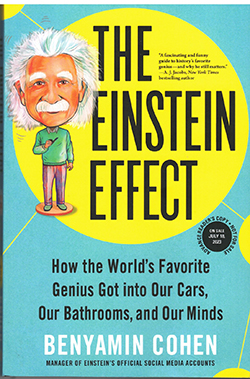The Einstein Effect: How the World’s Favorite Genius Got into Our Cars, Our Bathrooms, and Our Minds by Benyamin Cohen; sourcebooks © 2023; ISBN 9781728-246387; 313 pages plus bibliography, notes, acknowledgments, letter, and index; $16.99.
 S
S AN DIEGO — If you go to Facebook, Twitter, or other social media platforms, you’ll find that the late celebrity physicist Albert Einstein has an active online presence. No, that genius did not figure a way to come back to life – although if anyone could, it would have been him. These accounts are managed by Benyamin Cohen with authorization from Einstein’s estate, which is managed from Hebrew University in Jerusalem.
AN DIEGO — If you go to Facebook, Twitter, or other social media platforms, you’ll find that the late celebrity physicist Albert Einstein has an active online presence. No, that genius did not figure a way to come back to life – although if anyone could, it would have been him. These accounts are managed by Benyamin Cohen with authorization from Einstein’s estate, which is managed from Hebrew University in Jerusalem.
Gleaning from media outlets all over the world, including San Diego Jewish World (I’m flattered to say), Cohen publishes on social media a regular diet of stories and videos about the man people love to love, even though most people, including me, have no idea how anyone could go about measuring energy by the amount of mass multiplied by the speed of light squared. But the very fact that the mathematical logic behind the E=mc² formula is so very complex is one of the reasons that Einstein is so popular. Another contrasting reason was that despite having scaled the heights of genius, Einstein was a down-to-earth man, who was witty, absent-minded, kind, and devoted to social justice.
In this breezy, easy-to-read, enjoyable book, Cohen surveys the world that has incorporated Einstein’s thought and image into every-day life, with Einstein’s celebrity continuing to grow, rather than fade, since his death in 1955 at age 76.
Cohen tells of doctors and scientists studying Einstein’s brain, thanks to a coroner who extracted it from Einstein’s head, and it later being sliced into many tiny samples that could be fit onto slides for viewing under microscopes.
If you are driving, your car or cell phone probably utilizes some form of the Global Positioning System (GPS) to advise you where you are, and how to get where you are going. GPS was developed as an extrapolation of Einstein’s theory of relativity. Cohen also tells of astrophysicists scanning the heavens for alien life, utilizing Einstein’s theory. Cohen covers Einstein’s pacifism, his horror that his theoretical discoveries have been associated in the public mind with the atom bomb, and his love for the State of Israel.
Cohen goes on to describe the archives at Hebrew University, which tries to preserve every scrap of paper Einstein has ever touched – be they the ones on which he wrote out his theories, or penned letters to correspondents (copies were kept), or perhaps even doodled. Cohen also describes Einstein’s impact on people hoping to someday learn to travel through time (via wormholes), then turns to the professor’s penchant for casual (make that very casual) dress. Other interesting chapters concern people who share the surname Einstein, not all of them relatives, and how Einstein’s name and image appear in song lyrics, movies, television programs, and on such souvenir items as bobbleheads and t-shirts.
There also are essays by Cohen concerning the essence of Einstein’s several ground-breaking (space-breaking?) theories; the efforts of jealous scientists of his era to discredit him; and why Cohen imagines Einstein has remained so popular.
Of local interest, David Ellenstein of the North Coast Rep gets a mention in the book. He wrote a one-man play Einstein Comes Through, about an accountant who enjoys portraying Albert Einstein at school assemblies. Asked by Cohen why Einstein still is so popular today, the North Coast Rep director responded: “He had a love of food and a love of women and a love of jokes. That’s not how we normally think of the academic study of science. And I think that’s what’s appealing and draws people to him, that he is both a lover of life and a pursuer of intellect.”
*
Donald H. Harrison is editor emeritus of San Diego Jewish World. He may be contacted via donald.harrison@sdjewishworld.com